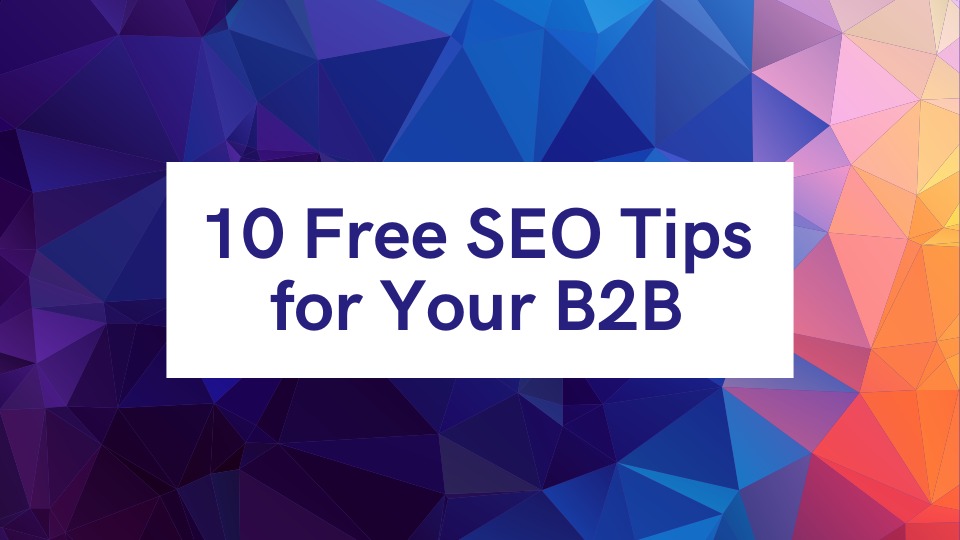10 Free SEO Tips to Help Your B2B eCommerce Business Attract New Wholesalers
Learn how to optimize your B2C website with these 10 SEO strategies designed to attract wholesalers, boost visibility, and grow your B2B business for free.

For B2B eCommerce businesses, growth often depends on attracting the right wholesalers at the right time. While B2B platforms are essential for managing orders and operations, they’re typically hidden behind a login page—making them less relevant for SEO.
Instead, focusing on SEO for your B2C website is one of the smartest ways to attract new wholesalers. SEO is a free and organic strategy that enhances your online visibility without the need for paid advertising. Given that 90% of B2B buyers start their purchase journey with an online search, having a strong organic presence is crucial. Once you establish and secure your position in search engine results, it significantly increases your chances of attracting potential wholesalers.
Table of Contents
- 1. Get to know your competitors
- 2. Use SEO to showcase your products
- 3. Get started with keyword research
- 4. Target long-tail keywords
- 5. Create valuable content for wholesalers
- 6. Leverage local SEO to attract nearby wholesalers
- 7. Highlight your wholesale benefits
- 8. Build a backlink strategy
- 9. Optimize for mobile
- 10. Monitor performance and adapt
However, it’s important to recognize that SEO is a long term strategy; it requires consistent effort and patience but yields sustainable growth over time. Here’s how SEO can help you grow your business and attract wholesale clients.
1. Get to know your competitors
Getting to know your competitors and how they position their brands and products is essential to help you understand how similar businesses are using SEO and where your opportunities lie.
What to analyze:
- Keywords: Identify the terms your competitors rank for and pinpoint gaps you can fill.
- Content strategy: Study their blog posts, product descriptions, and landing pages to see what works.
- Backlinks: Use tools like Ahrefs or Moz to see which sites are linking to your competitors and reach out to those sites for potential backlinks.
How it helps:
Competitor analysis isn’t just about copying what others do—it’s about finding ways to differentiate your business and address unmet needs.
Example:
If your competitor focuses heavily on eco-friendly products, but doesn’t cater to salons looking for high-end tools, you can create a niche strategy targeting that gap.
2. Use SEO to showcase your products
Your B2C website is your digital storefront, and it’s often the first interaction a potential wholesaler has with your brand. By optimizing your site for search engines, you can ensure your products are seen by the right audience.
How to do it:
- Write detailed product descriptions that include keywords wholesalers might search for, like “bulk organic shampoo supplier” or “wholesale hair care tools.”
- Add professional, high-quality images with optimized alt text to help search engines understand what’s on your page.
- Create dedicated landing pages for wholesale inquiries with strong calls to action (e.g., “Interested in carrying our products? Contact us for wholesale pricing!”).
3. Get started with keyword research
Keyword research is the foundation of any successful SEO strategy. It helps you understand what your potential wholesalers are searching for and ensures your site speaks their language.
How to do it:
- Use tools like Google Keyword Planner, Ahrefs, or SEMrush to identify high intent keywords such as “wholesale organic skincare products” or “bulk salon supplies.”
- Focus on commercial intent keywords that indicate buying intent, like “best bulk hair care supplier” or “discount salon equipment.”
- Don’t ignore question based keywords, such as “how to find a trusted beauty supplier,” which can inspire blog posts or FAQ sections.
Example:
If your research reveals that “vegan hair care wholesale” has significant search volume, you can create product pages or content optimized for that term.
4. Target long-tail keywords
Potential wholesalers often search using specific, long-tail phrases, like “eco-friendly cleaning products for retail” or “bulk organic cosmetics supplier in Europe.” These keywords might have lower search volumes, but they reflect higher buyer intent.
How to use long-tail keywords:
- Use tools like Google Keyword Planner, SEMrush, or Ubersuggest to identify relevant long-tail terms.
- Incorporate these keywords into your product pages, blog posts, and FAQ sections.
- Write blog posts that target these searches, like “5 Reasons retailers love eco-friendly cleaning products.”
Example:
A beauty brand might publish an article titled, “How retailers can benefit from selling vegan hair care products,” optimized with phrases like “vegan hair care wholesaler.”
5. Create valuable content for wholesalers
SEO isn’t just about keywords—it’s about offering value. By creating content that addresses the needs and questions of potential wholesalers, you can position yourself as an authority in your industry.
Ideas for content:
- Industry guides: “The Ultimate Guide to Choosing a Hair Care Wholesaler.”
- Success stories: Share case studies of retailers who thrived after partnering with you.
- Educational content: Blog posts or videos that explain market trends, like “Why natural ingredients are a top seller for retailers in 2025.”
ProtTip:
Include clear CTAs in your content, directing wholesalers to your contact page or a form to request more information.
6. Leverage local SEO to attract nearby wholesalers
Many wholesalers prefer working with suppliers in their region to reduce shipping costs and timelines. Optimizing your site for local SEO ensures you show up in location-based searches.
How to do it:
- Use location-specific keywords, like “wholesale salon supplies in Copenhagen.”
- List your business on Google My Business and ensure your contact details are consistent across all platforms.
- Encourage satisfied wholesalers to leave reviews, which can boost your local search rankings.
Example:
A wholesaler searching for “bulk beauty supplies near me” finds your website because you’ve optimized for location-based searches and added a Google My Business listing.
7. Highlight your wholesale benefits
Wholesalers are looking for more than just products—they want reliability, value, and support. Use your SEO strategy to highlight what sets you apart.
What to emphasize:
- Bulk pricing advantages or discounts.
- Fast and reliable shipping options.
- Sustainability certifications or eco-friendly product lines.
How to do it:
Dedicate a section of your B2C website to wholesale benefits. Optimize this page with keywords like “bulk beauty supply benefits” or “why partner with a trusted hair care wholesaler.”
8. Build a backlink strategy
Backlinks—when other websites link to yours—are one of the top-ranking factors for SEO. They signal to search engines that your site is trustworthy and authoritative.
How to build backlinks:
- Write guest posts: Partner with beauty and salon blogs to share your expertise and include a link to your site.
- Share your content: Promote your blog posts, guides, or case studies on social media and forums to encourage sharing.
- Collaborate with industry partners: Ask suppliers, customers, or partners to link to your site in exchange for cross-promotion.
- Create link worthy content: Publish unique resources, like “The Complete Guide to Hair Care Wholesale,” that other sites will want to reference.
Example:
A wholesale hair care brand could get backlinks by writing a guest post on a sustainability blog about the environmental benefits of their vegan products.
Pro tip:
Monitor your backlinks using tools like Ahrefs or SEMrush to ensure they’re coming from reputable sources and not spammy sites.
9. Optimize for mobile
Most people—including potential wholesalers—start their research on mobile devices. If your site isn’t mobile-friendly, you risk losing leads.
Quick fixes:
- Ensure your website loads quickly on mobile devices.
- Use responsive design so your site looks great on any screen size.
- Simplify navigation, making it easy for users to find your wholesale inquiry page.
10. Monitor performance and adapt
SEO isn’t a one-and-done task. You need to track your performance and refine your strategy based on what works.
Key metrics to watch:
- Organic traffic to your B2C website.
- Bounce rate on key landing pages.
- Conversion rate on your wholesale inquiry form.
- Keyword rankings for terms like “bulk beauty supplies” or “wholesale hair care products.”
How Turis supports this:
While SEO attracts wholesalers to your B2C site, Turis takes over once they’ve reached out. The platform allows you to:
- Manage wholesale accounts efficiently.
- Offer personalized pricing and bulk order options.
- Track wholesale trends and customer behavior through analytics.
Final thoughts
SEO is one of the most powerful tools for attracting new wholesalers to your B2B eCommerce business. By leveraging your B2C website, targeting the right keywords, and creating valuable content, you can build trust with potential partners and position your brand as the go-to supplier.
If you’re ready to grow your wholesale network, start with SEO—and when those leads come rolling in, platforms like Turis are there to help you manage them seamlessly.


